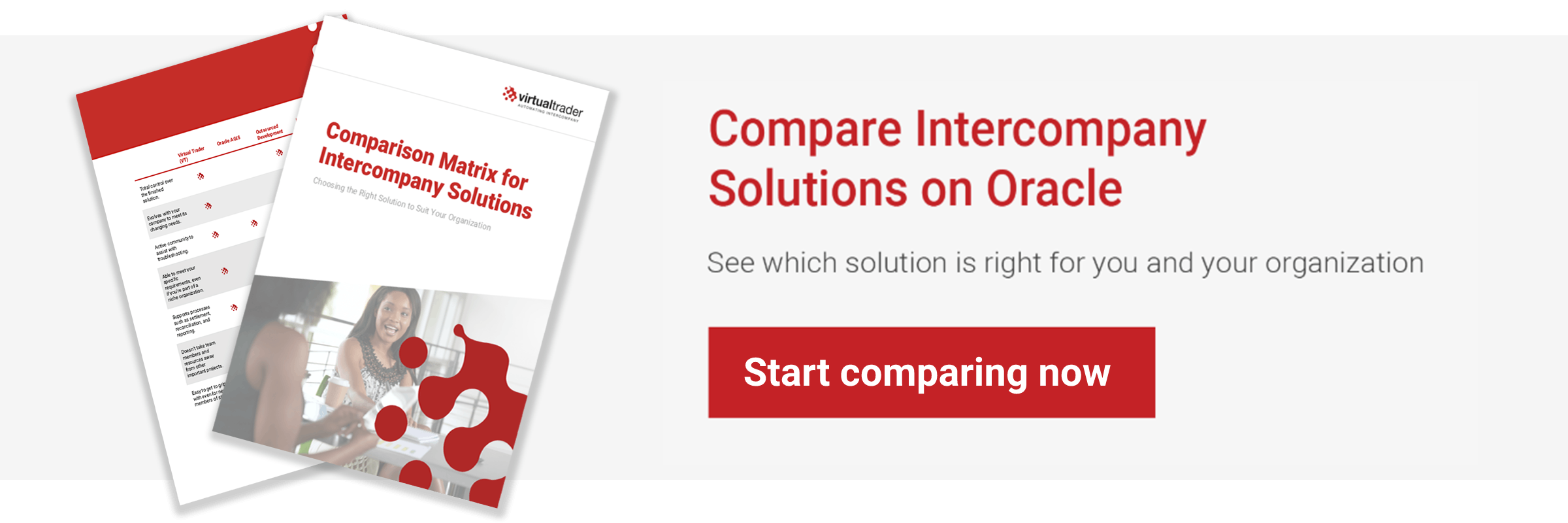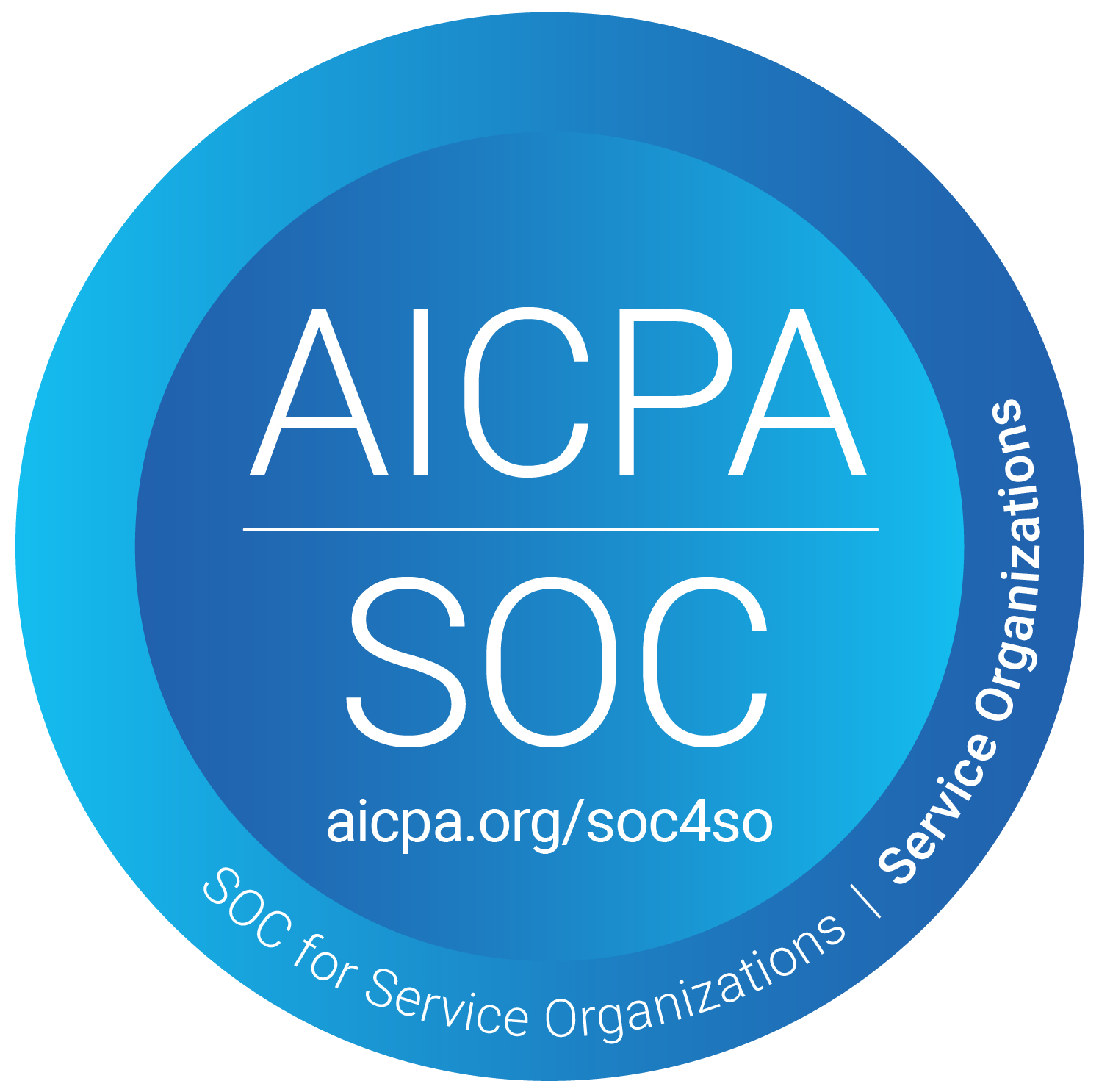Organizations are facing increasing numbers of challenges when managing intercompany transactions. These challenges spiral into other issues, such as improper or inadequate reporting, which can lead to serious consequences, including warnings, fines, or worse.
Virtual Trader is a solution hosted by Oracle that can greatly reduce or even eliminate these issues, so reconciling liabilities at period close is a much more streamlined process.
Here’s what these issues are and how Virtual Trader can help by enhancing Oracle functionalities.
Different Companies Using Different Systems Can Lead to Incompatible Data—but Virtual Trader Centralizes the Data
Usually, different companies within a single entity use different systems, which can lead to a variety of problems relating to settlement and reconciliation.
For example, imported data may be incompatible with a particular system, so you will need to make sure your data is converted to the right format before sending it to the receiving company.
Oracle is useful, but when companies evolve, handling increasing numbers of transactions becomes more challenging. Virtual Trader helps by making the tasks of creating, managing, and settling intercompany as a centralized corporate activity much easier in a number of ways:
-
Accepting transactions from any system (including spreadsheets) and producing intercompany from any source as invoices or journals. These will be posted to Oracle General Ledger and imported into the appropriate payable and receivable subledgers ready for settlement.
-
Converting all outbound accounting transactions into the format required by the receiving application.
-
Supporting a range of languages, including character scripts, such as Japanese and Korean.
Lack of Aging Analysis Makes It More Challenging for Intercompany Settlement — but Virtual Trader Offers This Feature
Companies don’t just need to settle their liabilities, they are required to do so on time; otherwise they may face serious and costly consequences.
Companies are able to create journals in Oracle AGIS and post them to the GL, but there’s no practical way to settle these assets. Unless companies are going to settle their balances in full, it’s difficult to keep track of the ones that have been paid and those that haven’t.
Virtual Trader eliminates this problem because it provides aging analysis. All eligible open items are offered automatic allocation — with the oldest being listed first. This means companies can always keep track of their assets and settle them before their due date.
Payables and Receivables Being Raised at Different Times — but Virtual Trader Has Automated Features
The speed and efficiency of intercompany reconciliation can be considerably affected when payables and receivables are raised by different companies using unrelated systems at different times. Since AGIS is unable to provide aging analysis, this scenario becomes even more challenging.
Virtual Trader prevents this issue by automating the following:
-
Transfer pricing – Virtual Trader automatically uses the natural price for an intercompany transaction. It can also evaluate appropriate transfer prices based on different business scenarios and support both common and complex requirements.
-
Tax evaluation and tax engine integration – Virtual Trader provides tax evaluation, evaluates intercompany tax requirements, and integrates with external tax engines, such as Vertax.
-
Creating matched AR and AP transactions – one of the biggest sources of errors occurs when matching entries aren’t posted in both ledgers concerned. Virtual Trader eliminates this issue by automatically producing payables with their matching receivables at the same time. These matched transactions are linked so that any changes in one will be applied to the other and any mismatches in data will be reported immediately.
Many Companies Still Rely on Spreadsheets — but Virtual Trader Is Able to Process This Data
Many organizations still use spreadsheets to record their intercompany transactions. Unfortunately, spreadsheet solutions are often time consuming because the source data needs to be imported or exported into corporate systems. In addition, these processes raise the risk of manual errors with little to no audit or reconciliation of results.
Oracle is able to accept spreadsheets, but they must be reformatted, which is both tricky and slow. Virtual Trader, on the other hand, is compatible with spreadsheet data and even processes it automatically.
Spreadsheets of any layout with content in any format can be imported and automatically processed. By preventing the need to extract and transfer data to and from spreadsheets, reconciliation is much more efficient. It’s also more secure, with a full audit and history of the evaluation procedures.
Intercompany Entries Are Usually Predefined — but Virtual Trader Allows for This Data to Be Independently Recorded
Intercompany entries are often predefined and controlled, but costs or revenue entries usually vary between the different companies within a single entity. For example, local knowledge of each company’s business operations and accounting standards might be needed to ensure these values are recorded accurately.
AGIS helps by allowing the accounting records of the sending and receiving companies to be entered independently. Virtual Trader helps even more by allowing for automated offset title changes; this is because there may be one or more changes of ownership required in some cases.
These title changes can even be cascaded — each with their own separate offset. This helps companies save considerable amounts of time.
Oracle Wasn’t Built for Intercompany — but Virtual Trader Is
AGIS is just one small part of the bigger picture that forms intercompany. Although it allows companies to approve and manage intercompany cross charges and accounting — keeping them in a centralized location — this isn’t nearly enough. Especially not for evolving companies. This is because Oracle wasn’t originally built for intercompany.
For starters, it was designed to handle the sale of physical goods because it was more attuned for trade. It can’t handle the sale of intangibles, such as warranties. Virtual Trader, however, can handle both types of goods because it is built for intercompany.
That’s why Virtual Trader can help enhance AGIS, extending its capabilities even further, and making it more useful for companies’ intercompany needs.
For example, a recurring problem faced by all companies seeking intercompany management technology is the need to find a solution that can respond to changes in requirement to meet the needs of a growing business and adapt and comply with new legislation.
Virtual Trader is designed to grow seamlessly with your company due to its Business Rules feature. These rules can be edited according to the changing needs of the company, whether it’s due to its evolution, a shift in the market landscape, or new regulations.
There’s More to Virtual Trader. Learn More in Our Ultimate Comparison Guide
There’s a lot more to Virtual Trader than we’ve covered here, but we understand that you may want to weigh up several options before you choose the ideal intercompany management product for your organization.
That’s why we’ve created a comparison guide. If you are interested in reading more about the pros and cons of three popular solutions: Oracle AGIS, outsourced development work, and in-house development — and you wish to understand how they compare against Virtual Trader — download the guide below.




 US
+1 800 961 9640
US
+1 800 961 9640

